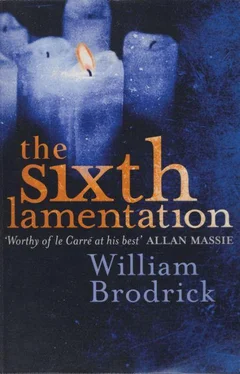William Brodrick - The Sixth Lamentation
Здесь есть возможность читать онлайн «William Brodrick - The Sixth Lamentation» весь текст электронной книги совершенно бесплатно (целиком полную версию без сокращений). В некоторых случаях можно слушать аудио, скачать через торрент в формате fb2 и присутствует краткое содержание. Жанр: Триллер, на английском языке. Описание произведения, (предисловие) а так же отзывы посетителей доступны на портале библиотеки ЛибКат.
- Название:The Sixth Lamentation
- Автор:
- Жанр:
- Год:неизвестен
- ISBN:нет данных
- Рейтинг книги:5 / 5. Голосов: 1
-
Избранное:Добавить в избранное
- Отзывы:
-
Ваша оценка:
- 100
- 1
- 2
- 3
- 4
- 5
The Sixth Lamentation: краткое содержание, описание и аннотация
Предлагаем к чтению аннотацию, описание, краткое содержание или предисловие (зависит от того, что написал сам автор книги «The Sixth Lamentation»). Если вы не нашли необходимую информацию о книге — напишите в комментариях, мы постараемся отыскать её.
The Sixth Lamentation — читать онлайн бесплатно полную книгу (весь текст) целиком
Ниже представлен текст книги, разбитый по страницам. Система сохранения места последней прочитанной страницы, позволяет с удобством читать онлайн бесплатно книгу «The Sixth Lamentation», без необходимости каждый раз заново искать на чём Вы остановились. Поставьте закладку, и сможете в любой момент перейти на страницу, на которой закончили чтение.
Интервал:
Закладка:
‘I told him if he couldn’t hide us, yes, a Nazi would be caught and hanged. But so would I. And the boy Schwermann had spared would learn the terrible truth about his own history. But if he assisted our escape, well, the child would be spared, a second, final time. The boy would grow, freed from the past, and some good would be salvaged from so much evil. And Schwermann? He would have been saved for the sake of a child, the least in this life but the greatest in the Kingdom. There was poetry in that. Father Rochet would have liked it.’ Brionne lit another cigarette. He passed one to Anselm.
‘Father Pleyon asked if he could write a report to Rome, explaining what had happened. I agreed. Robert was hidden in the convent as a refugee and I saw him every day until our passage was prepared for England.’
Anselm gave a moan of self-recrimination. Father Chambray had misunderstood every detail and Anselm had devoured the conclusions, principally because Rome had tried to hide them.
Brionne said, ‘When Schwermann was recognised on a train, as we were leaving Paris, he led them to me, one carriage further along. I was interviewed by a young officer, much the same age as me. I looked him in the eye and told him the same thing: Schwermann would hang, but what about the boy sitting on the bench outside? He was a brave man. He let us go.
The young Captain Lawson who could not remember anything when pressed by DI Armstrong, thought Anselm.
‘I built a new life for Robert,’ said Brionne. ‘He married, had children… but I was always waiting for Schwermann to be exposed, because I knew he’d come looking for me.’
‘So you went into hiding when he turned up at Larkwood Priory?’ asked Anselm.
‘Yes. And I would have stayed there if you hadn’t asked me if Pascal Fougeres had died for nothing.’
‘But Victor, why didn’t you reveal what had happened?’
‘I wanted to, but when I stood there, in the witness box, I couldn’t do it. I looked at Schwermann. I looked at the survivors. And I looked at Robert. I hadn’t been able to tell him anything before seeing the police. How could I explain to him that I’m not his father? How do I prove that I didn’t put his mother on the train for Auschwitz? That I didn’t betray all her friends, and my own? Only Father Rochet knew I’d been a secret member of The Round Table and he’s dead.’
‘But Robert knows you, loves you; he would have believed you.
‘Father, you forget something.’ His voice was steady uncompromising, detached. ‘I was trapped as a collaborator for the rest of the war. It was the price for Robert’s survival. I couldn’t tell him that. So when I took the oath in court, I told the truth, even though no one understood the actual meaning of what I said. It’s contemptible.’
The swift consumption of wine had taken its toll. Brionne licked his lips; his head began to loll, suddenly dropping now and again off its axis. He spoke as though about to weep. ‘And the irony of it is that afterwards, when I stood with Robert in the street, I knew I’d lost him because he thought I’d lied.’ He let out a great sigh. ‘And all the while Agnes, his mother, my dear friend, was alive, here in London, and I could have condemned Schwermann in her name… It is too much, too much…’
Appalled by the plundering self-sacrifice, Anselm said, ‘After all you have suffered, you can restore to Agnes her son. You have raised him from the dead. I will speak to Robert.’ He walked over and kneeled by Brionne’s chair, Taking the wine bottle out of his hand he said, ‘Victor, who betrayed The Round Table?’
‘Oh Father,’ he said mournfully ‘do I have to say it out loud?’
3
At 4.17 p.m. the waiting was over. Everyone returned to court: Counsel, solicitors, observers, the Press and, of course, Eduard Schwermann. When all were comfortably seated, Mr Justice Pollbrook came swiftly on to the Bench. Lucy, sitting beside Mr Lachaise, watched the string of jurors file into their seats. They all looked guilty. The clerk stood up with his litany of questions. The foreman stood up, ready to deliver her nervous replies. After each answer was given, the clerk repeated the words verbatim, to remove all possible doubt. The foreman confirmed the repetition.
They had reached unanimous verdicts on all counts.
Chapter Forty-Three
1
The foreman was a young woman in her mid-thirties, wearing narrow glasses that insinuated bookish gravity. She wore black but her skin was paper-white. Upon hearing the first verdict, Lucy lost all memory of the previous questions and replies; they were swallowed up by her final, irrevocable judgment:
‘Not guilty.’
The tidy phrase was hardly spent before a most awful collective gasp arose from one side of the courtroom. The survivors and their relatives who had watched the whole process of the trial, mute but concentrated, broke out in an agony of protest. Lucy released a shuddering sound, horribly similar to a laugh. She turned to Mr Lachaise. He sat still, with a repose wholly alien to the moment. His hand reached out to Lucy’s. They were joined like father and daughter.
The other counts on the indictment were read out. Each received the same verdict: ‘Not guilty.’
Lucy sat in a trance out of time, hearing words but unable to link them coherently. She could not dispel the image of Agnes, lying absolutely still, defenceless, consumed by silence. Everyone stood as Mr Justice Pollbrook left the Bench. And then from all around came echoing shuffles and bangs as though the court was being dismantled by stagehands impatient for home. The clatter became erratic, less insistent, and then faded.
‘Excuse me, it’s time to go.
‘I’m sorry?’ said Lucy stirring. The court and public gallery were empty, except for herself and Mr Lachaise. She was still holding his hand.
‘It’s time to go. I have to lock up,’ said the usher, pointing like a curator towards the door.
Lucy stood. Mr Lachaise withdrew his pipe and thumbed the bowl reflectively.
‘You can’t use that in here,’ said the usher officiously.
‘Indeed not. It’s just an old habit to occupy the hands.’ With a warm glance he said, ‘Go now, Lucy. ‘
She had always liked his accent and the engaging depth of his voice, like churning wet gravel. As she pushed open the swing doors she heard him ask:
‘Would you be so kind as to do me a small favour…?’
Then they closed.
Standing in Newgate Street, the presence of Agnes all around, suffusing metal, stone and cloud, Lucy hailed a taxi. ‘Hammersmith,’ she said woozily
2
Anselm left Victor Brionne, knowing he would continue to drink but knowing there was little he could do to hold him back. Victor — he could call him nothing else — had urged Anselm to tell Agnes about Robert. It was a secret that could not be withheld from the little time she had remaining.
Anselm left shortly before 5 p.m. He dropped into a newsagent, drawn by the blaring of a radio from behind a curtain over the back room. He leafed through a paper, waiting for the news on the hour. The shock verdict delivered in the trial led a series of other items, culminating in the shock transfer of a football player. Two shocks, one at either end.
Anselm walked out, dazed, and looked around. It was a lovely dusty, sunny day and there were children playing in the street.
3
The front door was slightly ajar. Wilma must have popped out. Lucy walked purposefully through to Agnes’ room. She kissed her forehead. It was warm and smooth, scented by baby oil — one of Wilma’s gentle ministrations. Lucy took both of her grandmother’s hands and said, ‘Gran, they’ve set him free. It’s all over.’
Читать дальшеИнтервал:
Закладка:
Похожие книги на «The Sixth Lamentation»
Представляем Вашему вниманию похожие книги на «The Sixth Lamentation» списком для выбора. Мы отобрали схожую по названию и смыслу литературу в надежде предоставить читателям больше вариантов отыскать новые, интересные, ещё непрочитанные произведения.
Обсуждение, отзывы о книге «The Sixth Lamentation» и просто собственные мнения читателей. Оставьте ваши комментарии, напишите, что Вы думаете о произведении, его смысле или главных героях. Укажите что конкретно понравилось, а что нет, и почему Вы так считаете.












